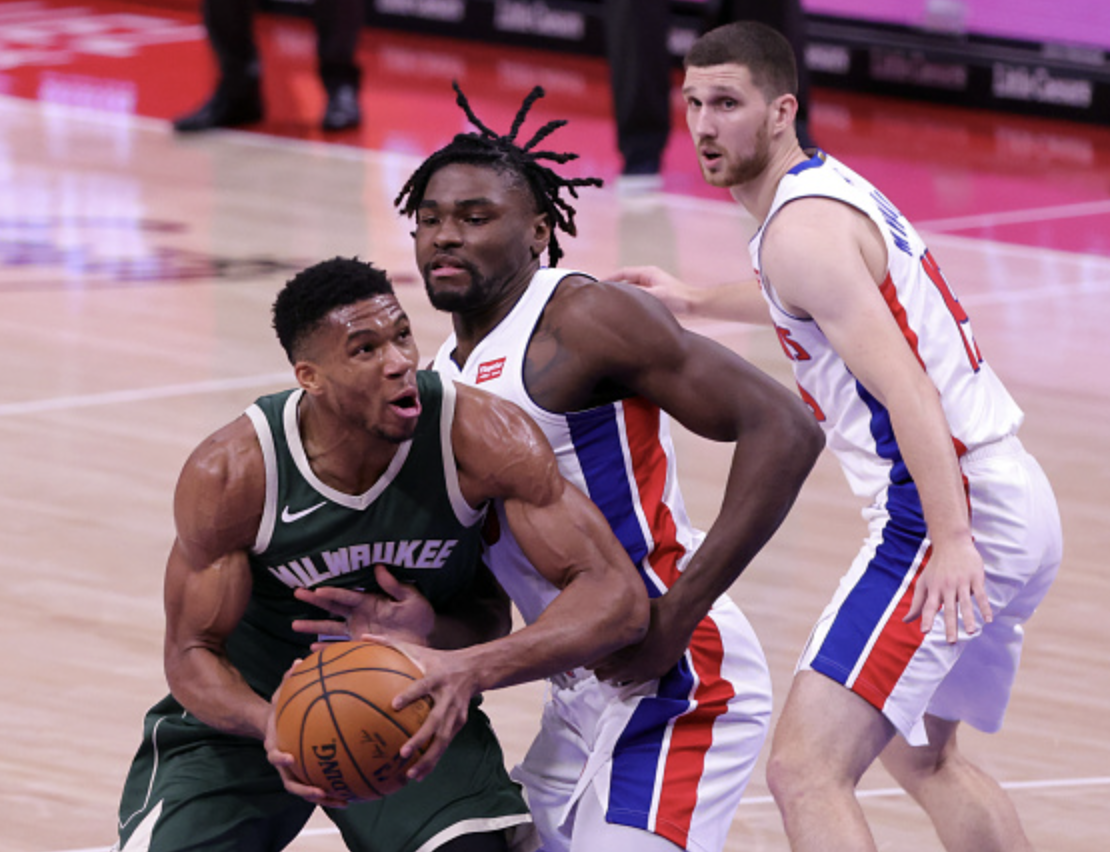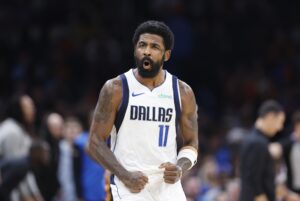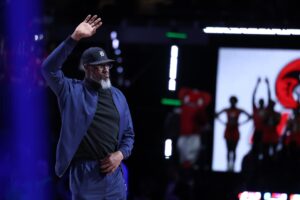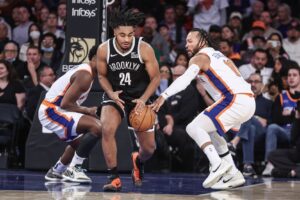A thrilling first round of the playoffs is complete, and it’s a great time to take stock of where each team stands as the second round starts. Ranking the best playoff players left isn’t just a fun exercise. It can work as a shorthand to see who should be championship favorites since superstars have such an outsized influence in the playoffs. If your team has two players in the top 15, or the best player, you should feel good about their title chances (health permitting, of course). If your team employs one of the seven players on this list (including honorable mentions) age 27 or under, get excited about many future playoff runs.
A reminder: this is a ranking of the best playoff players. Past individual postseason performance and team success matter heavily in these rankings. There was a bit of projection for some younger players on the list, but you need to have proven yourself in the playoff hothouse to merit serious consideration. I did not factor injuries into these rankings. Onto the best playoff players left in the postseason!
Ten Best Playoff Players Left in the NBA Postseason
Honorable Mentions (in alphabetical order):
Bam Adebayo: Adebayo’s ability to score, pass, and guard anyone makes him incredibly valuable. His versatility is what all teams need in the playoffs, but he needs one more extended run of play similar to his 2020 postseason for serious consideration.
James Harden: Harden has always put up numbers, but has a history of leaving his team wanting in big moments. Zach Lowe wrote the definitive breakdown of Harden’s postseason missteps in 2020, and Harden needs to definitively prove his postseason prowess to merit more consideration.
Jaylen Brown: Brown is an electric scorer and capable defender. Similar to Adebayo, he needs another full postseason like his 2020 campaign to get more consideration. He has the opportunity this year.
Jrue Holiday: Holiday’s lock-down defense across multiple positions and ability to create shots for his team makes him valuable. Questions about offensive consistency and efficiency leave him from being any higher.
Khris Middleton: This was the toughest omission, and I’m still not sure I’ve chosen correctly. Middleton was the number one option in crunch time for a team that just won the Finals. It’s unfortunate he’s likely to miss the entire second round; he had a chance to make this ranking look silly.
Klay Thompson: I’m stumped about what to do regarding Thompson, much like defenses game-planning against him. It feels ridiculous to call a 32-year-old guard coming off a torn Achilles and ACL one of the best playoff players. And yet, it doesn’t feel right to leave off someone capable of making 11 threes in a conference finals elimination game. He averaged 22.6 points per game in the first round on 45.8% from three, and his defense has improved tremendously since his January return. No player is capable of moving higher up the rankings after these playoffs than Thompson.
No. 10 – Ja Morant
No player is more emblematic of the league’s youth movement than Ja Morant. I’m breaking my own rules ranking Morant this highly while heavily considering past postseason performance. Consider this an indication of how incredibly bullish I am on Morant’s present.
Morant has scored well in his brief postseason career, but not very efficiently. His eFG% in the playoffs, which takes into account the extra point given in a three, is the lowest of any player on this list. I don’t give Morant a demerit for the Grizzlies’ five-game exit in Round One last year, though. His Grizzlies were ahead of schedule in winning two play-in games to make the first round, and the team was overmatched by the Utah Jazz buzzsaw.
In this postseason run, I’ve been impressed by his willingness to defer to his teammates in the right situations, then being able to dominate with his scoring ability when necessary. This was evident in the Game Five win over the Wolves, in which Morant scored 18 points in the fourth quarter of a two-point victory. He may not have been fully healthy against the Wolves, either.
Morant slashes, dashes, and scoops to the hoop. He soars above the opposition to cram unbelievable dunks, and uses incredibly (and incredibly underrated) court vision to set up his teammates in their preferred spots. He’s not a great defender, but he’s improved and displays an inspiring willingness to fight. His incredible blocks at the rim offer a unique level of rim protection most point guards cannot offer. Ja Morant is for real, and I’m guessing he will continue to prove it in the second round.
No. 9 – Draymond Green
Unlike the relatively-inexperienced Morant, Draymond Green finds himself at home on this list of the best playoff players remaining. No one benefits more from the emphasis on these being the best playoff players. Green’s now-famous “16-game players” quote inspired the criteria behind this list, so it’s only right he finds himself in the top 10.
There may not be a player in NBA history who makes the exercise of ranking players using stats feel so foolish, so I largely won’t try. 32 points in Game 7 of the 2016 Finals is a pretty good stat, though. Green doesn’t need to score to be the most impactful player in a game or series, however, which makes him unique on this list. Offensively, his passing skills and knowledge of the Warriors’ system and his teammates’ tendencies make him the best point guard on the Golden State roster. His ability to rebound and push the ball in transition is key to their quick-strike attack, and one of the defining characteristics of this team besides deep shooting.
Defensively is where Green makes the most impact. On a list of best playoff defenders, there’s no doubt who is number one. He can shut down the opposition’s top scorer and wall off the paint as a help defender and has proven those abilities many times during the team’s championship runs. Physically, his lateral quickness allows him to get anywhere on the court, and his peerless intelligence allows him to beat opposing scorers to their preferred spots. Green’s spot on this list might be controversial, but if the goal is to win games, he’s clearly a top-10 playoff player in the NBA.
No. 8 – Chris Paul
Chris Paul, the Point God, lands at number eight on this list of the best playoff players. No player manages to eke out any possible advantage for his team like Paul. He’s the rarest of breeds: a point guard who acts as a floor general on both ends of the court. You can see it when Paul is organizing the Suns’ Spain pick and roll. Deandre Ayton sets an on-ball screen, then one of the Suns’ numerous shooters screens Ayton’s defender and flairs out beyond the three-point line while Ayton dives to the hoop. The play is a display of Paul’s decision-making, as he can lob it to Ayton, hit an open shooter, or create a midrange shot for himself.
On defense, Paul often guards less threatening players but helps get teammates into position. He’s a better help defender than any six-foot guard should be. He possesses the hands to generate steals (2 per game in the playoffs for his career!) and the strength to body larger players.
Paul’s Suns advanced to the Finals last season, but before that, his postseason career had been considered a bit of a failure by many. That criticism was overblown despite some collapses, most notably a memorable meltdown against OKC in 2014. His penchant for getting injured in the playoffs is more concerning. You must consider a player’s injury history when they’ve been sidelined as frequently as Paul. In Houston, Paul’s injury is the biggest reason the Rockets were unable to defeat the Warriors in 2018. He missed games in 2015 and 2016 with the Clippers and missed two Western Conference Finals games last season.
Altogether, Paul is still one of the best playoff players in the NBA. His perfect game to close out the Pelicans is the latest feather in his cap.
No. 7 – Joel Embiid
With apologies to Nikola Jokic, there is no center better suited to playoff basketball than Joel Embiid. Offensively, his unstoppable post moves, touch beyond the arc, and ability to handle the ball make him an anomaly. His last three postseasons feature scoring averages of 26.2 points per game (this year), 28.1 (last year), and 30 (2020). He’s gotten in better condition as his career has gone on, and is now able to average 39 minutes per playoff game.
Embiid is a force on defense and raises his level in the postseason. He’s the best rim protector on this list and can bother guards enough on switches to avoid being targeted. Embiid’s nimble feet allow him to cover ground and contest shots from behind when needed. Ayton and Adebayo may be the only true centers better equipped to guard smaller players in the postseason.
Embiid hasn’t experienced much postseason success, and it’s a shame a broken orbital bone threatens his status for the upcoming series against Miami. Scoring consistently against the small-yet-scrappy Heat, who can send help from anywhere on the floor, would have been a huge feather in his cap. He just helped the Sixers take down a similarly-constructed Raptor team, despite playing with a torn ligament in his thumb.
No. 6 – Devin Booker
Devin Booker thoroughly impressed last postseason, the only one on his resume before this year. Just that run is enough to place him at no. 6 on this list. Booker is an undeniable scorer around the elbows. The Suns can call a complicated set to distract a defense, or a straight-up iso with everyone cleared out; either way, Booker is getting buckets. His smooth, pull-up-oriented game is perfect for the playoffs, and his strength and skill allow him to rise and fire even over the most difficult matchups.
Booker was incredibly impressive leading the Suns to two wins against the Clippers last year. Kawhi Leonard was injured, but Paul George and the cabal of wings who harassed Donovan Mitchell the previous round were still present. They couldn’t stop Booker, and no one truly could despite the Suns’ loss in the Finals. His offensive output is undeniable.
Booker isn’t a lockdown defender, but he’s not a liability, either. He can hold up against bigger opponents and knows how to funnel dangerous scorers towards a waiting helper. He executes defensive rotations seamlessly in concert with his teammates, who surely appreciate his willingness to fight.
Booker is well on his way to proving his status as one of the best playoff players in the NBA now, too. He came back from a hamstring injury to help the Suns overcome the Pelicans, and has a chance to rest before facing Dorian Finney-Smith and the rest of the Mavs’ defense.
No. 5 – Luka Doncic
Similar to Booker, Luka Doncic has proven his postseason abilities against the Clippers. Unlike Booker, Luka has lost two first-round series against LA. Also unlike Booker, Leonard was healthy and available for the entirety of both matchups. Dallas’ competitiveness was an accomplishment given the Clippers’ incredible defensive personnel and the innovative coaching of Tyronn Lue. It took the Clippers six and then seven games to put the Mavs away because of Doncic’s presence.
For posterity: Doncic is currently averaging 32.7 (!) PPG in his playoff career. His three-point percentage increases from 33.7% to 38.7%; he gets to the line more, as well. His ability to make the correct reads in pick-and-roll is unparalleled, and his size means he can make any type of pass. He can dance with defenders in isolation to set up his familiar stepback three, or take them inside the arc and bully them until he finds room for a mid-range jumper or floater. His lob passes turn less-skilled teammates into legitimate offensive threats.
Doncic came back from a calf strain in Game Four against Utah and immediately looked at home on offense. In Game Six, Doncic saw a trapping defense, a switching defense, a 2-3 zone, and Utah’s base drop coverage. No matter the scheme, Doncic carved them up and found open three-point shooters. Doncic could provide more effort defensively at times, but as a strong 6’8” forward, he doesn’t have a target on that end either. I expect this ranking will look smart when Doncic’s postseason is complete.
No. 4 – Jimmy Butler
Like Green, Jimmy Butler benefits from this list being so postseason-focused. That’s not an insult; we appreciate a player who can turn up the effort in the playoffs. Butler plays like he has an IV of Big Face Coffee when the calendar turns to April. He missed Game Five against Atlanta with right knee inflammation but is expected to be available against Philadelphia.
His bruising drives have a bit more force; his broad shoulders cave in the chests of his defenders with increased ferocity. Butler thrives in physicality, earning valuable shots at the rim and free throws. In the postseason crucible, those high-efficiency types of shots are incredibly valuable.
Like most of the players on this list, Butler plays both ends of the court, and that gives him a slight edge over Doncic. He’s tied for third among players considered with a career average of 1.6 steals per game in the postseason. He doesn’t get those thefts by overt gambling, either; his strong hands and ability to rove on defense mean he can force turnovers within his assignment. His size, strength, and knowledge of the opposition mean his “assignment” can be nearly anyone in the league, and can even change within a game.
Butler isn’t a great outside shooter, but he must get some extra shots up in practice with the lighter postseason schedule. Making 35% of his career postseason threes is a solid improvement on his career 32% mark in the regular season. Put it all together, and Butler is clearly one of the best playoff players in the league.
No. 3 – Jayson Tatum
Jayson Tatum exemplifies the player archetype most likely to lead to postseason success. Every team would love to build around a 6’8” wing who can create and cash off-the-dribble threes, has smooth shot creation skills in the midrange, and fluidity finishing around the basket.
He’s also a key piece of the league’s best defense, and has shown he can guard the other team’s best player and switch across multiple positions. Tatum can also dig into opposing players’ dribbles and hound passing lanes as a defender. The improved playmaking he has demonstrated this season means he has no glaring on-court weaknesses.
Still only 24 (he’s only 19!), he’s experienced an impressive amount of postseason success. Tatum actually led the Celtics in scoring as a rookie when the team made the Eastern Conference Finals, then repeated the feat during the team’s ECF run in the 2020 playoff bubble. This Celtics team seems even better suited for playoff success than past iterations, and the ascension of Tatum is a big reason for that.
No. 2 – Stephen Curry
Stephen Curry has famously never won MVP despite winning three titles, so let’s consider his per-game averages in Finals games only: 26.5 points, 6.2 assists, 5.7 rebounds, and 1.5 steals on 42%/38.5%/92.7% shooting splits. That’s decent! Sure, the shooting percentages are down a bit from Curry’s incredibly high standard; they’re also basically equivalent to Damian Lillard’s career numbers.
Curry is the most undeniable, unstoppable offensive force in the game today, and that title persists in the postseason. He dropped 47 facing a box-and-one against a tough, intelligent Raptors team in the Finals with Kevin Durant and Klay Thompson unavailable due to injuries. One defender shadowed Curry, and the other four ignored the other offensive players to stand just outside the paint and watch Curry’s every movement. He did what he’s done his entire postseason career: launch threes from unusual distances, exploit crevices in the defense to seek out driving lanes, and use relentless off-ball movement to create opportunities for teammates.
More than any other player on this list, Curry is an offensive system on his own. His shooting ability needs no description. Curry’s facility with the ball in his hands in isolation or in the pick-and-roll makes him a deadly scorer. His willingness to play without the ball gives teammates increased opportunity and rhythm. Curry’s leadership is apparent; you cannot overlook his role as a more vocal leader with this new iteration of the Warriors. Finals MVP or not, there are few players you’d want on your postseason roster more than this 6’3” guard.
No. 1 – Giannis Antetokounmpo
Giannis Antetokounmpo, the reigning Finals MVP, has earned the right to be number one on this list of best playoff players. A 50-point performance in the Finals clinching game cements his status, not to mention the most memorable defensive play since LeBron James’ chase-down block in the 2016 Finals.
No player on this list offers the combination of unstoppable offensive play and standout defensive ability Antetokounmpo possesses. His ultra-extendable, sinewy limbs allow him to cover ground in transition like no one in the league. That physique also allows him to roam the court on defense, where he displays an elite ability to read an offense and ignore decoy action. He can appear in an instant, yet remains unanticipated by his opponents.
Antetokounmpo is an athletic marvel, the type of player you can appreciate while knowing nothing about the intricacies of the game. If you know those intricacies, however, you see the seven-foot behemoth with a Buck on his jersey has more than overwhelming physicality. He can use the attention he draws to whip cross-court passes to shooters in the corner. He can beat the roll man to the basket before the point guard passes to the teammate that was open just moments ago. Of course, he can also grab a rebound, run the floor in three strides, and cram a dunk over two backpedaling defenders. He’s even displayed improvements in creating his own shot by scoring 0.96 points per possession on isolations. That regular-season number is higher than the output for Booker or Tatum. For these reasons, and more, Giannis is the best postseason player in the league.
Main Image: Embed from Getty Images






